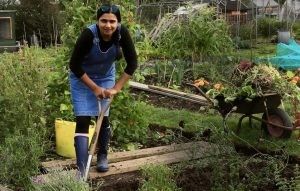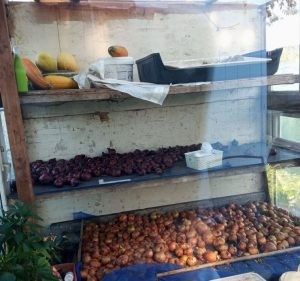AMARJIT SINGH GUDAIL, who is a member of the Royal Horticultural Society (RHS), agrees there is now a shortage of allotments in the country.
Last Sunday (15), he showed Eastern Eye around the Bixley Fields Allotments in Southall in west London, from where it is possible to see “up to six planes queuing up to land at Heathrow”.
Bixley Fields, just off Merrick Road, is a 10-minute walk from Southall railway station, and now only 20 minutes from central London’s Bond Street on the Elizabeth Line.
That explains the proliferation of highrise buildings in Southall, once known as “Little Ludhiana” as this was the first point of settlement for Indian immigrants from the Punjab in the 1960s and 1970s. “Property prices in Southall have doubled since the Elizabeth Line was built,” said Amarjit.
In April this year, a team from the RHS visited the Bixley Fields Allotments, the biggest in Southall, where Amarjit is in charge as the “site manager”. Of the 76 plots in Bixley Fields, half are taken up by enthusiastic Asian gardeners, both men and women, who made their applications years ago.
The RHS team consulted Amarjit ahead of the construction of the RHS/Eastern Eye “Garden of Unity” at the Chelsea Flower Show. The garden has been moved to a school in Battersea.
Amarjit said: “There was a time when people were not that interested in allotments. Now it has become very difficult to get one.”
He was commenting on a recent report in the Guardian which said: “There are few things so quintessentially English as the allotment, but the number of people waiting for a space of their own has almost doubled in the last 12 years.
“The most recent figures, obtained by independent artists and supported by Greenpeace through freedom of information requests, show there are now at least 157,820 applications sitting on English local authorities’ allotment waiting lists, up 81 per cent from 12 years ago, when researchers found the figure was 86,787.
“The average waiting time for an allotment was three years, while residents of Islington, north London, faced a 15-year wait. The local authority with the longest waiting list was Bristol, with 7,630 outstanding applications, followed by Sunderland, Portsmouth, Southampton, Edinburgh and Manchester.
“A spokesperson for the National Allotment Society said the steady increase in demand for allotments had been down to the cost of living crisis, the increased interest in ‘growing your own’ during Covid, and better awareness of sustainable growing and healthy eating.”
Southall is a very diverse place but, according to Amarjit, there is very little social intermixing between different religious or ethnic groups.
“However, the one place where they come together is in the allotments. Here, we have Asians, black people, white people, Sikhs, Hindus, Muslims, Christians. We only ask people to have an interest in gardening.”
He finds the English tend to focus on “beauty and flowers”, and the Asians on vegetables. He points out an allotment with dahlias. “We call her the flower lady.”
In one Asian-owned greenhouse, there are shelves stacked with onions. There are banana plants looking healthy despite the drop in temperature. They provided a touch of the tropics.
At Bixley Fields, Amarjit’s wife, who is as enthusiastic a gardener as her husband, has cleared their family plot “ready for the planting of garlic”.
Amarjit, who is partial to the blackberries that he grows, says: “This has been a good season. It has been especially good for runner beans, sweetcorn, squashes and chillis.”
Although it is the end of the season, it is still possible see lettuces and the last of the tomatoes on the plants.
On BBC Radio 4 last week, Today presenter Mishal Husain joked: “Got to get some tips from them. I failed even at tomatoes this summer. I thought tomatoes were fairly easy to do – it’s very worrying.”
Her remarks came after fellow presenter Amol Rajan had followed up on the Guardian report on the shortage of allotments.
Rekha Mistry, who has made a name for herself by writing and presenting TV programmes about her allotment, told him: “I am no longer on our allotment. I gave up my allotment last year because I moved home to the Peak District. But I had an allotment for 13 years in London.
“And when I got that plot, I think that was the best thing I ever did. It was a joy when I was told I could have one.

Asked the reason for her sense of joy, she explained: “Because it’s something I’ve always wanted to do is grow my own. At that time – remember, this is going back 13 years – (allotments) were still a retirees’ playground. It wasn’t for young folk.
“When I told my friends that I was doing this, they sort of just smiled, ‘Oh my dear, what are you doing?’ but it’s something I wanted to do. And that’s what came about.
“And once I started growing things, I wanted to learn more. I went into the RHS, doing their course, because I really wanted to learn more and work with plants. And my life suddenly changed from there on.”
She expressed concern that councils were now selling their allotments to developers: “Some places are council run, some are private allotments. When they decide to sell allotment land, that’s when it really bugs me.”
She declared: “I don’t like allotments being sold. But if you are going to sell land, why don’t we say (to councils and developers), ‘Please make sure that there’s a piece of land (for gardening).’ Although there’s housing, we need to have some space for growing – for everyone. That is one thing that’s missing when we have developments. We’re not just developing houses, we need to be developing green spaces for growing.”
Impressed with Mistry’s passion, Rajan urged her to go into politics.


